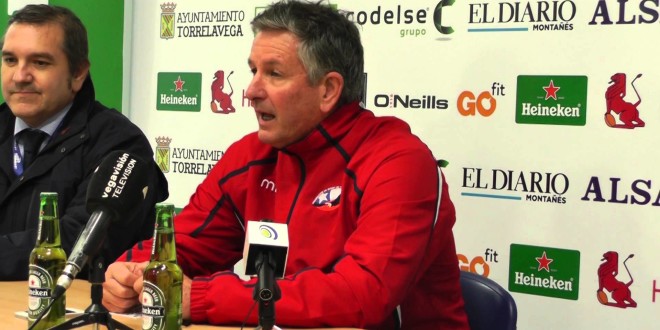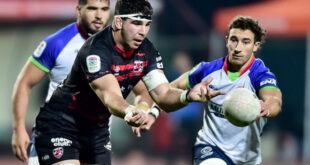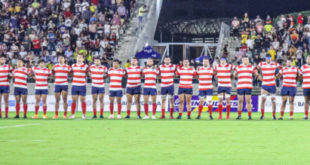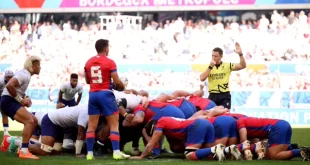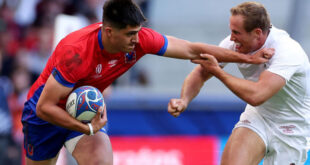Less than two months out from the start of the new Americas Rugby Championship, Chile’s head coach resigned. In the latest edition of Hands On!, Americas Rugby News caught up with Paul Healy, the former head coach of Los Condores, to give readers a first-hand account of why he stepped down, and his challenge to FERUCHI to make dramatic changes.
What were your highs as head coach of Chile?
There were many in a short space of time:
2015 Senior XV South American Champions (Brazil, Paraguay, and Uruguay)
2nd place 2015 u19 South American Championship
1st place Corrientes 7s
1st place Mar del Plata 7s
5th place 2015 Pan-Am Games 7s
Qualified for 2016 Olympic repechage
Women’s Olympic qualifiers 2015
And your lows?
Really, within the rugby side of my experiences in Chile, not many. I worked hard – as did the players and some staff – on improving many things on and off the rugby field, and I compliment them for that. If I had to isolate anything, it was the lack of functional training facilities, lack of expertise in rugby-specific strength and conditioning, and lack of team organization. I would add the non-committal nature of the important issue of rugby development structures – including the day-to-day operational functions and communication within the management of the federation.
Why did you resign?
My main frustrations and the decisions I made recently were the result of non-communication, lack of organization, lack of urgency and commitment, no realistic structure, no understanding or professionalism in and around the federation. This made my job, working environment, and objectives very hard to achieve.
I made many recommendations, had my opinions, and tried to incorporate the vast knowledge and experience I have to improve the rugby programs, to develop and improve the functioning of rugby in Chile, but I did not seem to be able to receive any information or responses. At the time I felt this disrespectful to me as a person and professional trying to achieve his objectives – to develop players and coaches and ultimately attain results and improve the profile and world rankings of Chilean rugby in both 7s and XVs.
The lack of communication and other issues that I mentioned did not stop at me as an individual, and unfortunately I had staff and others employees of the federation who had the same problems and found it very difficult to function at the required level. These uncertainties then also reflected on the players in their training, performances, and general life environments. For me in my role as Head Coach and in line with normal protocols and my own high standards, many behaviors and discrepencies were unacceptable and pushed away or ignored.
As a professional person contracted to do my role as best I am able to within that rugby environment, this did not happen in my time there, and I felt I had been totally humiliated – vulnerable and ignored by certain people within the organization. As I reflect back I was totally misunderstood in what I had been trying to achieve in Chile, and I was not willing to further put in jeopardy my successful career and my vast experiences to work in this unhealthy, unprofessional environment that had been created recently within this federation, especially within the management structure in the last six months.
I know now that outside of Chile there is no confidence or expectation that Chilean rugby can move forward and develop in the future under the current circumstances, which is very disappointing. I sincerely hope to be wrong, because there are some excellent people in rugby in Chile that have the right rugby culture and ideals, ideas, ethics, and the intelligence to take rugby forward and create a positive, enjoyable, successful environment both on and off the field.
Can you point out why Chile lost 54-10 away to Spain?
There are many reasons. Firstly we were definitely under-prepared both physically and tactically. This was highlighted several times by myself to the management and Director of Sport over a period of three months previous to the tour.
The lack of communication, uncertainty, and ineffectiveness of the federation hindered our preparations greatly. We did not have the necessary coordination with the foreign players that were to be included in the squad, and consequently the ability to select the best possible squad and staff. We also had some internal management issues to deal with which performances and day-to-day functions of an international touring rugby squad.
What then needs to be the focus to produce effective change?
I believe that the focus needs to be concentrated on creating an environment which is as close to being professional as possible. It would start from the directors, management, and staff, and go down to the payers and all competitions across Chile. There is an urgent need to create a stable, enjoyable working environment with the best people in the correct positions making the decisions. They need people who have experience in a sporting business environment with the ideas, people skills, attitudes, ethics, and passion for rugby in Chile, and to be all working in the same direction with the same objectives and required outcomes.
Players have previously spoken about a lack of preparation and having to pay their own travel expenses. Would you say the mood deteriorated in 2015?
Yes, absolutely. All these documented issues the players have mentioned are true and most definitely detracted from their focus and objectives. The players make many sacrifices to represent their country and these efforts are not recognized within the federation.
Uruguay is making great strides with investment in administration and infrastructure being paramount. Why is Chile not attempting the same?
Unfortunately, in my opinion, at this stage Chile does not have the correct resources available or the best qualified people with the right objectives, structures, or planning in place to be able to execute this project. They lack the ability to effectively communicate and gain the necessary confidence in the stakeholders and be consistent in the product they are trying to promote, namely rugby in Chile. The sport is changing all the time and countries like Chile need to move and adapt to these changes in the most efficient way.
Some of this is due to a different rugby culture and different concepts of work ethics. Uruguay realized this back in 2003 and have been working very hard, on and off the field, over the last dozen years to be in the position they are in now. They have continually grown and developed slowly over this period of time. After many trials and tribulations they are ticking all the right boxes in their growth, development, professional environment, and performances.
A high performance model is clearly required. How could it be set up in Chile?
I agree, and was pushing for this to happen a few months after my arrival in Chile. I presented a detailed high performance model inclusive of all the required information to the federation, incorporating the World Rugby High Performance plan through to the year 2017, which was then to be reviewed and discussed. Included in this plan was the implimentation of regional academies and a centralized rugby academy to develop strength and conditioning, coach and player education, and business acumen for improved managerial skill sets. This was not implimented nor discussed during my time there.
What do you see as being realistic objectives for Los Condores in the Americas Rugby Championship?
Since I have resigned, I am not too sure. My objectives were to be well prepared and have the best possible players and staff for the campaign. This would have given Chile the opportunity to be competitive against teams within the top 20 in the World Rugby Rankings and to improve on each performance week in, week out. It is not ideal preparation to play two games in four days against a representative team from North of Chile. It is frustrating to not previously have organized a way to play a strong regional side from Argentina which would have benefited the team’s preparations immensely.
One objective must be to simply have the best possible players training, ready and available for selection to start the tournament at home with a strong performance. I believe it is a wonderful opportunity to develop players in Chile, to give them an insight into a consistent level of international rugby and give the players a goal to set themselves, now and for future tournaments. It is a chance to compete with the best in the Americas and gain worldwide respect for rugby in Chile. This exposure could also result in a professional contract and the chance to play or coach at a high level and eventually bring those experiences back to Chile.
How many World Cups until Chile qualifies under the current 20-team format?
Unfortunately I have to say that under the current environment and processes, this objective will be very difficult to achieve in the near and distant future.
Paul Healy is the former Head Coach of Chile. In previous roles working within the sport he has been a Director of Rugby at Spain’s Ordizia Rugby club and in Romania with CSM Bucharest. Assistant coach at Stade Français in France and in Wales with Swansea RFC with former Reds and Wallaby coach, John Connolly. Also High Performance Coaching roles in his native Australia and both the Technical Advisor and Coaching Coordinator for the Uruguayan Rugby Union over several years and in their 2003 Rugby World Cup. Following his resignation he has returned home to Brisbane and is looking at new opportunities.
 Americas Rugby News Rugby news from across the Americas!
Americas Rugby News Rugby news from across the Americas!
